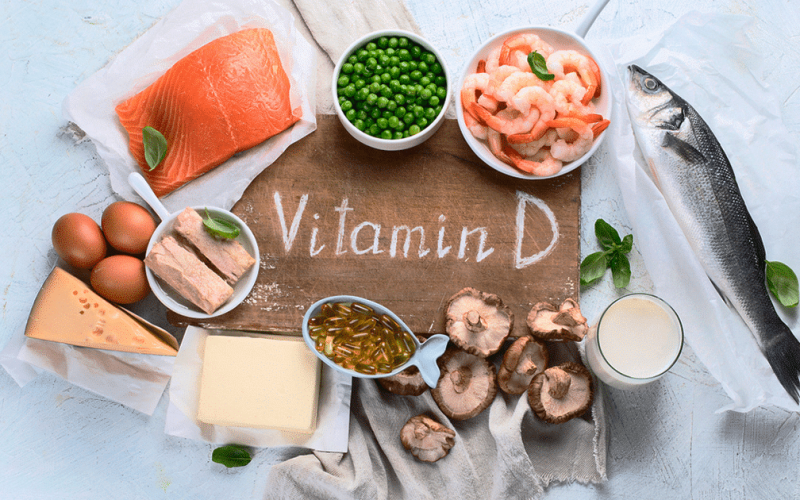Vitamin D is a fat-soluble vitamin that belongs to the family of compounds that include Vitamins D-1, D2, and D3.
It is sometimes called the “sunshine vitamin” as our body naturally produces the vitamin from our exposure to sunlight. We can also get this vitamin from several food sources including egg, fortified cereal and dairy product.
Fascinatingly, vitamin D is regarded more like a hormone (a messenger in the metabolism process) than a vitamin (participant in our metabolism).
This nutrient is estimated to regulate the expressions of about 2000 genes – a massive contribution to the critical processes occurring in every cell throughout the body.
It has also been linked to almost every health benefit known to humankind, from the immune activity and brain health to muscle and bone health, cardiovascular health, pregnancy and lots more.
On the other hand, a vitamin D deficiency can give rise to a myriad of health complications such as rickets and osteoporosis. In America, it is estimated that almost 40% of adults are deficient, about 30%-50% of children and adults in Canada are also deficient.
Results from other parts of the world, including Australia, India, some parts of Africa, New Zealand, the Middle East also show a high number of D deficiency in both children and adults.
What are the health benefits of the sunshine vitamin?
Vitamin D supports a lot of processes in the body. Here are some of the benefits linked to the vitamin.
Supports bone and teeth health
Vitamin D is generally known to be a critical factor in the absorption of calcium and phosphorus. These two nutrients are essential in the development and maintenance of healthy bones and teeth.
Not getting enough vitamin D to synthesize these nutrients can lead to the development of a variety of bone diseases, and irregular skeletal structure, such as bowlegs in children (rickets), soft bones in adults (osteomalacia), and fragile bones in the elderly (osteoporosis).
Reduces the risk of Respiratory infections
When you increase your vitamin D levels, the chances of you having a cold or flu becomes slimmer than usual.
Children who took vitamin D supplements to boosts their levels experienced a significant reduction in the occurrence of influenza, according to a 2010 study.
A 2018 review of available research found that studies have discovered that vitamin D helps lower the incidence of influenza.
However, the authors also reviewed other studies where vitamin D didn’t reduce flu risks. Therefore, more studies are required to determine the relationship between vitamin D and flu prevention.
Helps reduce depression
Vitamin D may be a crucial factor in mood regulation and warding off depression, according to research. One study noted a significant increase in the mood of people suffering from depression after receiving vitamin D supplements.
Healthy pregnancy
In a 2019 review of existing research, suggested that pregnant women with vitamin D deficiency may be more prone to developing pre-eclampsia and giving birth preterm.
Doctors also associate low vitamin D levels with bacterial vaginosis and gestational diabetes in pregnant women.
However, it’s important to note that a 2013 study found that high vitamin D levels during pregnancy may increase the child’s risk of food allergy during the first two years of life.
How much do you need?
There have been some conflicting opinions over how much of the sunshine vitamin is needed for optimal health. Recent studies suggest that you need more vitamin D than the previously prescribed intake.
The daily value of vitamin D can be measured in micrograms (mcg) or international units (IU). One microgram of the sunshine vitamin is equal to 40 IU.
The required daily amount for vitamin D are as follows
- Infants, 12 months and below – 400 IU (10 mcg)
- Children from 1 to 18 years – 600 IU (15mcg)
- Adults up to age 70 – 600 IU (15mcg)
- Adults above 70 years – 800 IU (20 mcg)
- Pregnant or breastfeeding mothers – 600 IU (15mcg)
What are the food sources of vitamin D?
Apart from getting more sun exposure, you can also get vitamin D from certain foods. However, not all foods can produce this nutrient naturally, so some foods are fortified. Foods rich in vitamin D include:
- Egg yolk
- Sardines
- Salmon
- Shrimp
- Orange juice (fortified)
- Cereal (fortified)
- Milk (fortified)
- Yoghurt (fortified)
It can be difficult getting your required daily amount of this nutrient from food sources and sunlight alone. Taking vitamin D supplements can help boost your levels.
Bottom line
Vitamin D plays a pivotal role in maintaining optimal health, and more studies are being carried out to unearth its significance continually.
This hormone-like compound supports almost all the processes in the entire body throughout life, from immune and Respiratory health to strong bones, cardiovascular health, healthy pregnancy, and so much more.
Although some people think they can meet the daily require intake of this nutrient from food sources and sun exposure alone. However, scientific evidence suggests that most people need more.
Because of this, doctors recommend that you take vitamin D supplements to support the other sources and achieve the required amount for optimum health.
References
- Vitamin D Deficiency and Its Health Consequences in Africa – NCBI
- Prevalence of Vitamin D Deficiency and Associated Risk Factors in the US Population (2011-2012) – NCBI
- Randomized trial of vitamin D supplementation to prevent seasonal influenza A in schoolchildren – Oxford academy
- Vitamin D Deficiency and Risk for Cardiovascular Disease – NCBI
- Vitamin D—Effects on Skeletal and Extraskeletal Health and the Need for Supplementation – NCBI





